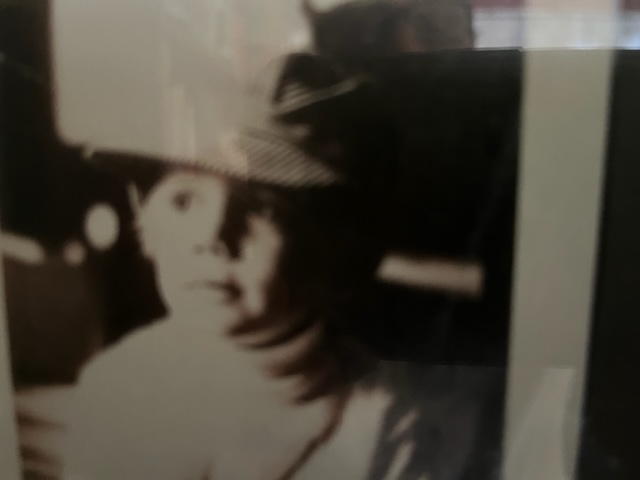I wasn’t always terrified of technology.
Were you?
When I was five, I was the first kid in the neighborhood trusted to run a Lionel electric train by myself.

Later, I was a star Centipede player at Fred the Framer’s, a Hudson, Ohio picture-frame shop that doubled as a video game arcade. (Old Fred knew which way the wind was blowing.) And I had an Atari 5200!
In college in the late 80s, I used electric typewriters to write my papers. Mine was an electric Smith-Corona and it had a feature that would let you erase whole lines of type if you made a mistake. I didn’t know how it worked, exactly—how did it remember what I’d just typed, so it covered that precise letter in white?—but I wasn’t afraid of it. I don’t need to know everything. (You know what Chicago Bears’ defensive lineman Refrigerator Perry said about the thermos, right? “It keeps hot stuff hot and cold stuff cold. How does it know?”)
The first time I wrote on a computer was at a publishing company where I went to work in the early 1990s—my first job out of college. They had these primitive Macs, whose plastic had yellowed with age to roughly the color of nicotine-stained fingers. But they were pretty good for writing, and they were reliable. Now and then they broke down—you’d turn it on and the little Mac smiley-face would have x’s instead of eyes—and you’d just unplug the thing, and lug it a few blocks to a repair shop, where it would be fixed. Inconvenient, yes. Again, though: No terror involved.
Soon I bought a Mac of my own and installed a graphic design program called PageMaker, which let me lay out my own monthly print newsletter, called The Murray Meaning. That wasn’t the act of a technophobe, and I remember feeling none of the gnawing dread, unpacking my first one or two Macs, that I feel even while downloading an app, today.
What turned me tech-truculent?
It was the fucking Information Superhighway, which was the first term we heard for the Internet.
What on earth was this? The publisher sent its editors down to the University of Illinois, in Champaign-Urbana—where the World Wide Web (WWW) had actually been invented—to check it out. We drove four hours to see the Internet. But we got mind-murdering drunk at the motel the first night, and comprehended very little of what we saw the next day, as the computer nerds lectured us on the technical aspects of the Web—networks connected with networks, and ones and zeroes flying in formation, something about the Pentagon—and then gave us an hour to explore the Web on our own. I remember spending a lot of time gaping at the website of the Seattle Mariners—the first baseball team that had one.
Soon, we all had email addresses like 1003745@compuserve.com. And instead of thinking about communication and politics and human beings and love, I was trying to figure out what in tarnation was a TCP/IP, let alone how to configure the motherfucker. Remember this soul-searing sound?
Meanwhile, the early adopters of this technology—people in the communication business, who treated it as if it was changing the very natural laws of this work—and writers at Wired and Fast Company magazine, who kept talking about a “new economy” that was somehow untethered to the banalities of supply and demand and the old-school drudgery of food and shelter and physics itself—these people were making a young writer very nervous about his future.
Because I did not care about all this Internet bullshit. If this tech talk, which sounded to me like small talk, was going to dominate the next 10 or 20 years of public discourse—and if mastering the technology was going to be the only way to keep up with that conversation—I wasn’t going to make it very long.
I was 26, and I was worried I was about to be made obsolete. And that, I think, is when I started to associate technology with anxiety. As my own publisher put it, on printed brochures to sell workshops on Internet communication: “Don’t be left behind!”
***
Almost 30 years after the Internet changed everything, it’s well to ask: Did anyone who wanted to keep up, get “left behind”?
I didn’t, I guess.
I’ve been writing online constantly since the early aughts. I also learned how to make videos, and I started posting them on YouTube around 2008. Check out the situation at 9:25 in this 2009 video, for instance.
I’ve used those tools, and social media, to talk about communication and politics and human beings and love. I reckon I’ll use these new tools for that, too.
But only to the extent that I must.
This tech stuff is such a bother. My dad went from having a secretary who took dictation and typed perfect letters, to taking computer courses in order to keep a writing career going, in his early 60s. I admired that, and wonder if I have that level of commitment to learning how to operate ChatGPT.
I remember Dad, dying of cancer at 85, watching a TV commercial and asking me with a bewildered look on his face, “What is GoDaddy?” And my answering to our mutual relief, “It doesn’t matter, Dad. You don’t need to know.”
But you and me? In this world of everyone for themselves and let the robots take the hindmost, I’m afraid we still need to know.
The web was invented at CERN (the particle physics lab near Geneva). The first web browser, Mosaic, was created at the University of Illinois.
Compuserve was not part of the internet. Like Prodigy and AOL, it ran on its own servers.
I’ll get off your lawn now.
The only thing more inevitable than the march of technology is the march of Shel Holtz.